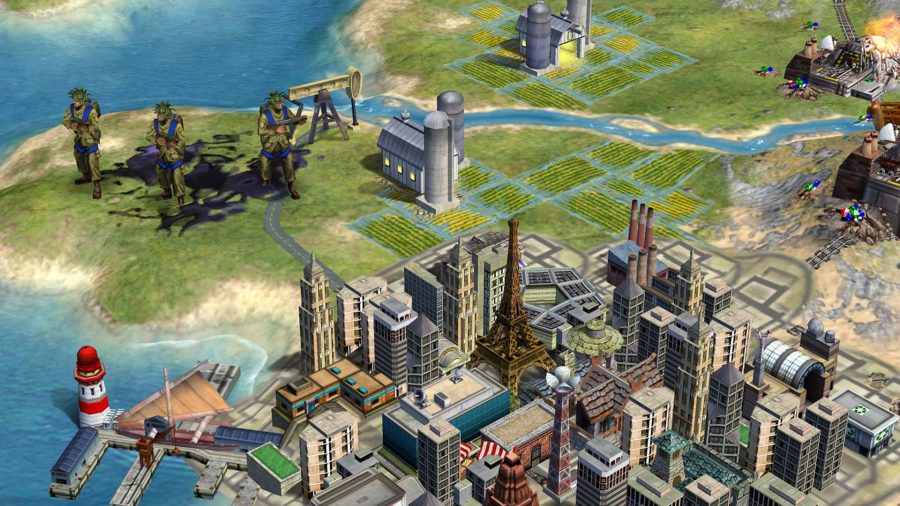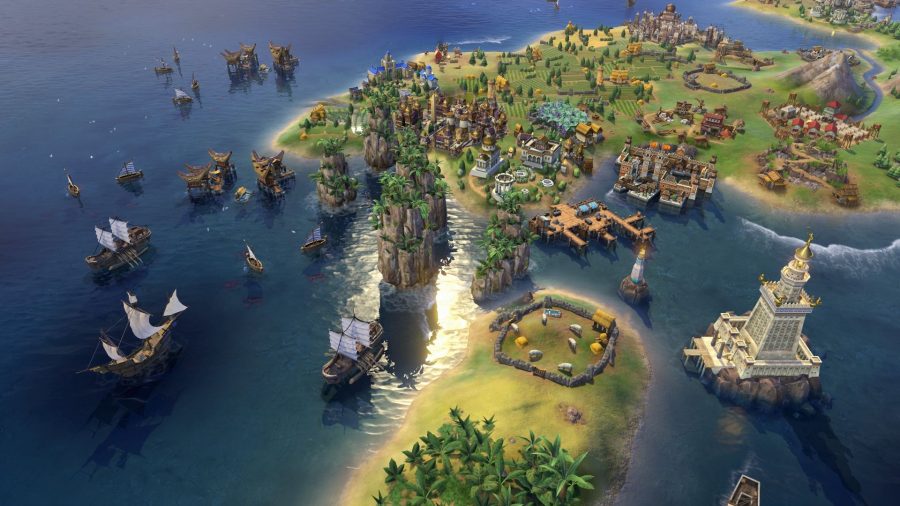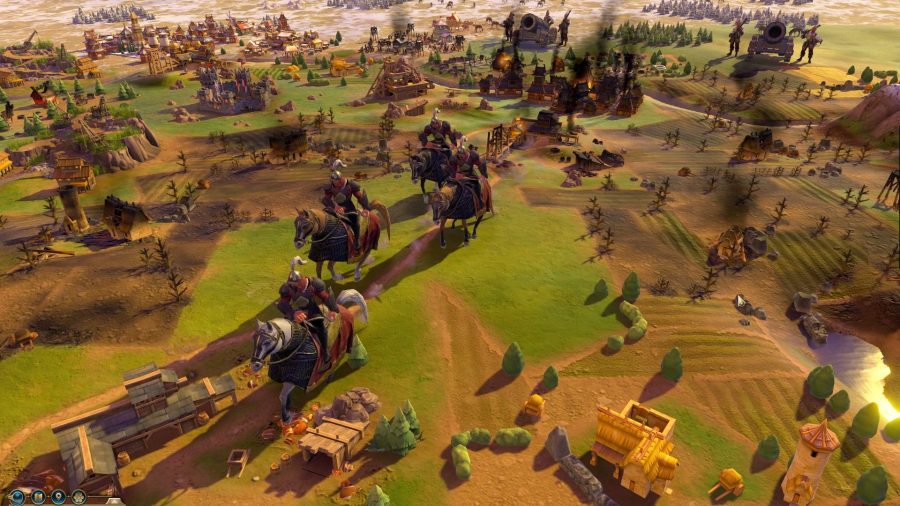There were over six years between Civilization 5 and Civilization 6, and with the announcement of the New Frontier Pass for the latter, developer Firaxis is clearly not ready to move on to the next instalment in its most famous series quite yet.
But we’re definitely at the point where we can take stock of Civ 6 so far, consider what’s worked and what’s been less successful, and start dreaming of the future. It’s worth noting that Civ 6 was one of the most full-featured of the series at launch, packing in most of its big systems. Naturally, we’d hope for the same from Civ VII – for the most part, we take the current state of Civ VI as our base and wonder how Firaxis can build from here. I’m excited to introduce corporate and economic warfare, while we want to see a more authentic take on colonization and a less deterministic one on technological progress (even though, as the resident pedant, I insist on pointing out that such progress has literally been determined by history…)
Corporations and entrepreneurs
The implications for the late-game and beyond are obvious: corporate activity has defined the modern world from the late 19th century, from the so-called Robber Barons that necessitated anti-monopoly laws to the vast multinationals that drive globalization today. But a system representing private enterprise could emerge in a weak, simple form as early as the Classical or Medieval eras with Craftsmanship, Currency, or Guilds and then gather pace throughout the game.
Civ 4 introduced corporations in its Beyond the Sword expansion, and while elements of that approach could be reused, we can go bigger. How about this: a city with high output in a particular yield has a chance to spawn an entrepreneur (and later, a corporation). High cultural output could spawn theatre troupes, record labels, or movie studios, lots of money could create investment banks, and high production output obviously opens the door to any number of manufacturing firms, while science equals research consortiums or tech startups. This could also be linked to buildings or districts (we like unstacked cities and the district system – Civ 7 should keep it), with more potent corps locked behind higher-level buildings and techs.

Once spawned, corporations can have a range of effects on your city, your civ, and later, other civs around the world, and these could be tied to many other game systems. These could reflect historic ties to certain Wonders or Great People – if you can generate Henry Ford, his activation power could be to give you the Ford Motor Company. Corps could obviously raise their relevant yields but might drain others or hurt local amenities if they’re allowed to behave exploitatively.
In the very late game, when all Civ’s systems tend to go a little bit wild anyway as victory looms, the corporate activity could fly off the leash and affect civs around the world. Cultural corporations could provide huge boosts to tourism – perhaps unlocking unique districts like Disney’s theme parks – while tech companies could positively or negatively affect city loyalty and amenities, in a nod to the spread of social media, online shopping, and international news (real and fake). If global financial corporations are sufficiently powerful and unregulated, perhaps they could raise money and the chance of random events that empty every civ’s coffers to simulate the 2008 financial crisis. The possibilities – and gameplay choices – are endless.
Economic victory
Given that current victory types are associated directly with culture, faith, science/production, military might, and, since the Gathering Storm expansion, diplomatic favor, it’s a little odd there isn’t one linked to Civ’s other major resource – money. Firaxis 4X games have had economic victories before – Alpha Centauri featured a scheme to corner the world economy, which cost a terrific amount of money to initiate. But that was back in 1998 and is a little simplistic by today’s design standards. A new victory type should be more interesting than simply acquiring more gold more quickly than everyone else. Fortunately, with the above corporations system, we have a suggestion.
Assume for simplicity’s sake that all the corps in the world are publicly traded on a global stock market. Your goal in an economic victory is to hold a controlling interest in a certain number or percentage of them. In theory, you could brute-force your way to this by making stupendous amounts of money, as in Alpha Centauri, but the game should be tuned to make this extremely difficult. Taking other measures as part of a multifaceted economic victory strategy that brings in other game systems should be a practical necessity.
For instance, perhaps it’s only possible to gain a controlling interest in a corp by manipulating its share price? You could use spies to abduct or assassinate corporate leaders, acquire valuable intellectual property and leak it to undercut foreign corps’ advantage, or hand it to your own corps to help them compete. You could take defensive measures, too, against predatory rival civs: you could drive up your own corps’ price by pumping money into them or by ‘encouraging’ them to merge.
If all else fails, there’s always warfare. Indeed a system like this could replicate certain wars in history that have been fought for economic reasons: corps could get involved in international trade, perhaps generating and trading their own unique luxury or strategic resources, and civs could go to war to defend their corps’ rights to do so (e.g., the Opium Wars) and, by extension, their value.
Continents and colonisation
Civ 6 had named and distinct landmasses but didn’t make the best use of them. Some civs, such as the English, got uniques that benefited from settling different continents, and the system is linked to leader agendas and historic moments, but it doesn’t affect the game all that much on a systemic level.
As much as there is a lot of baggage associated with the colonial age, it’s a significant historical period. Building global and nation-agnostic mechanics that deal with expanding onto non-native continents would provide a whole new strategic problem and could also provide some interesting internal dynamics.
Cities settled on other continents could suffer automatic penalties to loyalty, amenities, and/or growth to represent the difficulties of governing so far from home and give a more realistic penalty for ‘going wide’ than Civ 5’s arbitrary global hit to Happiness, or Civ 6’s more elegant but equally arbitrary escalating cost per settler and district. Expansionist civs could have a range of specific policy cards, governor titles, and other choices for expansionist civs to manage. New AI-controlled civs – or at least city-states, if that’s not possible – could arise from failing colonial empires to model the breakdown of European rule in the Americas across the 18th and 19th centuries. Goods could also be worth more when trading with civs or cities on distant continents where they are rarer.
Bolder tech system
Something about Civ that has never really changed is its linear tech tree. It’s obviously forgivable that, in a game about history, the same techs crop up every time – it’s not like you can make up techs like you can in a sci-fi 4X – and Civ VI made some rare changes to this side of the game, introducing Eureka moments and separating cultural techs into a different – albeit identically arranged – civics tree. We can build on this.
Civ VII could include more techs and civics, and be more inventive in their presentation. The tech tree already has layers, traditionally putting more peaceful techs at the top and military techs at the bottom. We can push these directions out further, filling the space with more new techs and creating something like a ‘tech web’ as seen in other 4Xs to make your research choices more strategic.
We could also take a leaf from Paradox’s book and borrow Victoria II’s tech system, in which you research a ‘headline’ tech, and thereby open the random chance of learning an invention associated with that tech – the production line invention could follow after researching replaceable parts, for instance. This could enable further choices in other game systems to raise the chance of learning these inventions.
More meaningful alliances
Rise & Fall gave us different alliance types – Research, Cultural, Economic, Military, and Religious. While it was cool to see alliances get a little extra depth, this approach reduces them to merely another way to gain resources rather than reflect the reasons alliances are formed in the real world or the strategic possibilities they enable.
In Civ 7, how about the ability to recognize an alliance between multiple partners as a formal international organization, like NATO or the Warsaw Pact, with the ability to name them for added flavor? We could add options to set membership requirements, like approved government types, and obligations, like maintaining a certain level of military strength, nuclear arsenal, or economic income. Pacts could agree on directing their efforts more effectively: they might divide city-states among themselves, prepare voting intentions for the World Congress, share espionage intelligence, coordinate missionary efforts in spreading a shared religion, and so on.
It would surely generate more interesting outcomes in larger games, and the AI might need a little tuning to recognize scenarios when it would be appropriate to do this, but if that can be achieved, then there are endless occasions in the average game that could trigger a pact: shutting down warmongers, mid-table civs clubbing together to catch up, civs united by a shared religion or trade, etc.

Sillier, more, and more ambitious scenarios…
Scenarios mixing up the game rules have been a feature of Civ for a while now, but Civ 6 has doubled down on them – there are loads in the game already, and the New Frontier Pass is adding even more.
Firaxis has not been shy about these. Civ 5 had a ‘Scramble for Africa’ scenario in which the internal make-up of the African continent was randomized with each playthrough, as well as a battle to control the Wonders of the ancient world, a depiction of the American Civil War, and even one set in an alternate steampunk world of soot-spitting flying machines. Civ VI’s first scenario took on the Viking Age and was the series’ largest at the time, and last year Firaxis took an April Fools’ joke and made it real, bringing battle royale to 4X with Red Death. This shows that scenarios can draw on not just the entire breadth of history – which would be enough – but anything Firaxis can make up around the water cooler.
It’s hard to point at anything specific to ask for from new scenarios other than more, please! We would love to see more wargame-themed scenarios to really push the boundaries of how the game can be used for hex-based military conflicts and more scenarios set in the modern day, where it’s less about expansion and more about getting on with your neighbors and navigating tough geo-political problems. A big war could spell the end of the world like it would in today’s time, and a scenario that leans more on diplomacy and politics could be interesting. We’re also curious about modes that take individual game elements and dial them up beyond the point of absurdity, like one-hit-kill units.
One question arises from this discussion: are we at a point where Civ as a whole is what it is, and now it’s just about finding new ways to mess with that?
…But in the main game, less is more
There are lots of systems in Civ 6 that, while interesting at a macro level, ask you to worry about loads of little details to get the most benefit. Different types of great work and buildings to put them in? Cool. Double-checking your theming bonuses every time you get a new one to ensure they’re optimally arranged? Snore. Unstacking cities by placing Wonders and Districts on the map? Nice. Constantly worrying over their placement because of conflicting terrain requirements and adjacency bonuses? Miss me with that.
We’re saying there’s a lot of busy work in Civ 6. It’s as if Firaxis’s game design philosophy is that no sliver of game space can be left empty – it must all be filled with choices, no matter how small or unnecessary. This spoils the experience for more aesthetic or narratively inclined players who like to fill those rare consequence-free spaces with something of their own imagination. They may not be a large demographic, but even for the rest of us, this tendency, at best, adds nothing of significance, and at worst, it undermines otherwise interesting big-ticket features by adding arbitrary complexity. Civ 7 should focus on systems that turn the history-defining phenomena of humanity into long-term strategic choices, not bother itself with which painting is hanging where.





